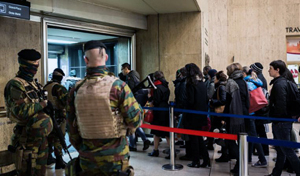Washington D.C., May 8: The prime time for brain development in a child's life is the first year, where the infant spends most of the time asleep. It is the time when neural connections form and sensory memories are encoded.
However, when sleep is disrupted, as occurs more often among children with autism, brain development may be affected, too.
New research led by the University of Washington finds that sleep problems in a baby's first 12 months may not only precede an autism diagnosis but also may be associated with altered growth trajectory in a key part of the brain, the hippocampus.
The study, which was published in the American Journal of Psychiatry, researchers report that in a sample of more than 400 taken of 6- to 12-month-old infants, those who were later diagnosed with autism were more likely to have had difficulty falling asleep.
It also states that this sleep difficulty was associated with altered growth trajectories in the hippocampus.
"The hippocampus is critical for learning and memory, and changes in the size of the hippocampus have been associated with poor sleep in adults and older children.
As many as 80 per cent of the children with autism spectrum disorder have sleep problems," said Annette Estes, director of the UW Autism Center and senior author of the study.
"In our clinical experience, parents have a lot of concerns about their children's sleep, and in our work on early autism intervention, we observed that sleep problems were holding children and families back," added Estes, who is also a UW professor of speech and hearing sciences.
"It could be that altered sleep is part-and-parcel of autism for some children. One clue is that behavioural interventions to improve sleep don't work for all children with autism, even when their parents are doing everything just right. This suggests that there may be a biological component to sleep problems for some children with autism," said Estes.
To consider links among sleep, brain development, and autism, researchers at the IBIS Network looked at MRI scans of 432 infants, surveyed parents about sleep patterns, and measured cognitive functioning using a standardized assessment.
At the outset of the study, infants were classified according to their risk for developing autism: Those who were at higher risk of developing autism -- about two-thirds of the study sample -- had an older sibling who had already been diagnosed.
Infant siblings of children with autism have a 20 per cent chance of developing autism spectrum disorder -- a much higher risk than children in the general population.
In the current study, 127 of the 432 infants were identified as "low risk" at the time the MRI scans were taken because they had no family history of autism.
They later evaluated all the participants at 24 months of age to determine whether they had developed autism. Of the roughly 300 children originally considered "high familial risk," 71 were diagnosed with autism spectrum disorder at that age.
Problems with sleep were more common among the infants later diagnosed with an autism spectrum disorder, as were larger hippocampi. No other subcortical brain structures were affected, including the amygdala, which is responsible for certain emotions and aspects of memory, or the thalamus, a signal transmitter from the spinal cord to the cerebral cortex.
The authors note that while parents reported more sleep difficulties among infants who developed autism compared to those who did not, the differences were very subtle and only observed when looking at group averages across hundreds of infants.
Sleep patterns in the first years of life change rapidly as infants transition from sleeping around the clock to a more adult-like sleep/wake cycle. Until further research is completed, Estes said, it is not possible to interpret challenges with sleep as an early sign of increased risk for autism.






Comments
Dear Search Truth
Dont forget that because of sufi saints only your forefathers got to know who is Allah his Rasool SAW and the quran and got opportunity revert/embraced to Islam.
we are also sure that if we follow sufism definitely we get madad from Allah
community is divided because of some khabees and very sure this people are the agents of Israeli with beard weird shakal.
haha isis creation of israel anthe , alquaida CIA anthe , Kurdish peshmerga and nusra front mossad anthe , hezbollah iran anthe , mostly nimmappa nu israeli ne irbeku . hahaha ... love to see salafist and sufist wars ... salafist who are mainly funded by saudi ar strongest supporter of wahbism , so terror is in their blood . makla nim fault nimge gottagthane ilvalla ... third rated rogues
Dear Imran..
Are you sure? Dont divide people in the name of sufism. ISIS is linked to israeli agents and Media is portraying islamic... anyway dont be deceived by both the israeli agent and the media. Both this is run by the certain evil agents which is trying to destroy Islam by deception and LIES (which they will never succeed)... Till now U believe what is said in the media.. EVen after so many BIG LIES...
Just follow the QURAN and prophet Muhammad pbuh , You will not find any terrorist...Unless people start reading QURAN which is for Whole of MANKIND from our LORD... its veryvery EASY for the evil agents to DECEIVE those who are FAR from the TRUTH.
Believe in Sufism which will save the world. Spread the message of Sufi saints which is universal brotherhood. If all of us follow Sufism then there will not be any terrorist in the world.
Add new comment